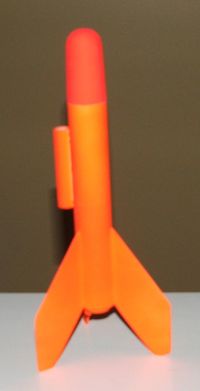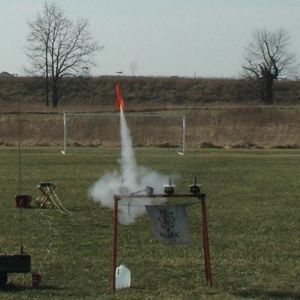| Diameter: | 1.04 inches |
| Manufacturer: | Semroc  |
| Skill Level: | 1 |
| Style: | Clone, Sport |

(Contributed - by Bill Eichelberger - 01/29/06)

Brief:
The Mark II is the Semroc take on the model rocket that started all this mess,
Orville Carlisle's Rock-A-Chute Mark II from 1957. It is a fairly blunt, simple
little rocket that's a surprising performer and a definite conversation piece
at the pads.
Construction:
The parts list:
- Main body tube
- Balsa nose cone
- Laser cut balsa fins
- 18mm motor tube
- Thrust ring
- 2 centering rings
- Engine hook
- Screw Eye
- Kevlar® thread shock cord
- Sewing elastic shock cord
- 12" parachute
The instruction booklet for the Mark II is up to the typical Semroc standard, equal parts instruction manual, history lesson, and artist's rendering. Instructions are clear and easy to follow, the Mark II being only slightly more difficult to tackle than any other skill level one kit. Fins are laser cut balsa which I shaped for better performance and attached with LocTite Gel CA. All other construction, including fillets, was done with Elmer's Wood Glue and the project was finished and ready to paint in a single afternoon. The finished product resembles an upscaled Estes Mosquito or possibly a Maxi-Streak except for the large launch lug, (actually it's a piece of heavy-walled body tube.)
Finishing:
Finishing in an (almost) historically correct scheme made this a very simple
project. The finish started with thinned Elmer's Fill 'n' Finish to kill off
the tube spirals and balsa grain. After sanding, the entire rocket was then
sprayed with white primer to better allow the florescent colors I chose to pop.
I have several cans of mystery florescent colors left over from my plastic
model days and this project allowed me to put a dent in two of them. I painted
the bottom of the rocket florescent orange and the nose cone florescent red. I
didn't bother with clear coat, preferring to leave it with the more vintage
flat look.
Construction Rating: 5 out of 5

Flight:
I wanted to get an idea how this performed as a small field flyer, since that
was where I figured its future was in my launch queue. First flight was on an
A8-3 in a brisk wind. Because of the rather blunt profile of the nose cone, I
expected a fairly low level flight and was surprised when it streaked off the
pad looking much like an Estes Mosquito. It was pretty obvious that the A8-3
was going to be my only small field option if I wanted to get this back when
flying on the local soccer fields.
Flight #2 was on a B6-4 and again, the altitude was surprising. It cocked heavily into the wind.
Flight #3 was a C6-5 flight and unsurprisingly was the most impressive of the three. The Mark II leapt off the pad and disappeared from sight. Luckily one person on the flight line managed to keep it in sight all the way up to ejection.
Recovery:
Recovery on the first flight was fairly close to the pads, mostly because the
vintage Estes 8" chute failed to open. In the end it didn't really matter
because the rocket is easily light enough to be a streamer bird.
The second flight recovered fairly close to the pad when the old chute failed to open until about fifty feet from the ground. This was fortunate because it was heading for the access road, which would have resulted in an impact that it probably wouldn't have survived.
Finally, since I had flown it without any recovery device on the third flight, there wasn't much to keep an eye on. I didn't pick it up until it was floating back over my head. It landed softly and without damage several hundred yards down field. Next time I need to bring a streamer along.
Flight Rating: 5 out of 5
Summary:
No CONs on this one. It's a cool piece of history, a surprising performer, and
a quick and easy build.
Overall Rating: 5 out of 5
Other Reviews
- Semroc Mark II By Alan Tuskes
The Mark II is a single stage Retro-Repro kit of Orville Carlisle's Rock-A-Chute Mark II model rocket. It is, as noted by the history sheet that came with the kit, not a clone kit, but rather a reproduction of a classic kit updated with the latest technology and building components. Opening the packaging and laying out the contents revealed what would be an easy build, using the high ...
- Semroc Mark II By Dennis McClain-Furmanski
Brief: A reproduction of the very first model rocket built by Orville Carlisle in 1957. Single stage, parachute recovery. This is a very faithful reproduction of the original which now resides in the Smithsonian along with a few component updates. Construction: The kit includes: 1 main body tube, 1.04" diameter 1 18mm motor tube 1 Balsa nose cone 1 set laser ...
 |
 |
Flights
Sponsored Ads
 |
 |











